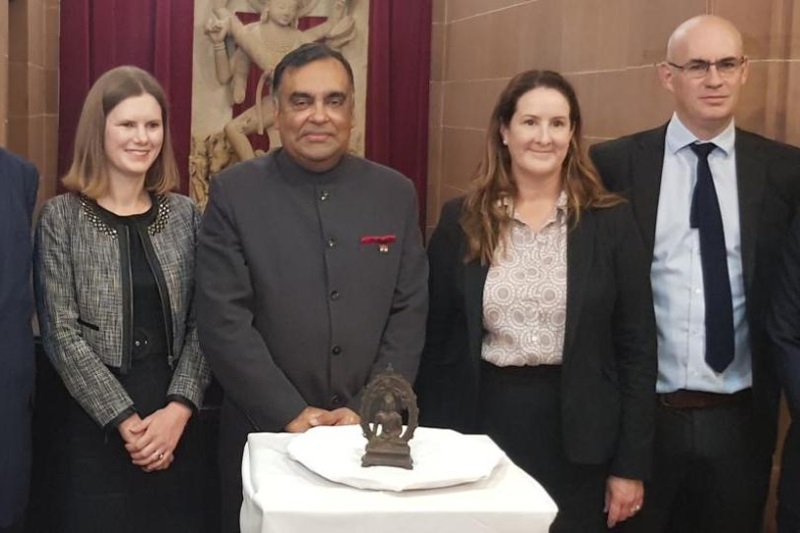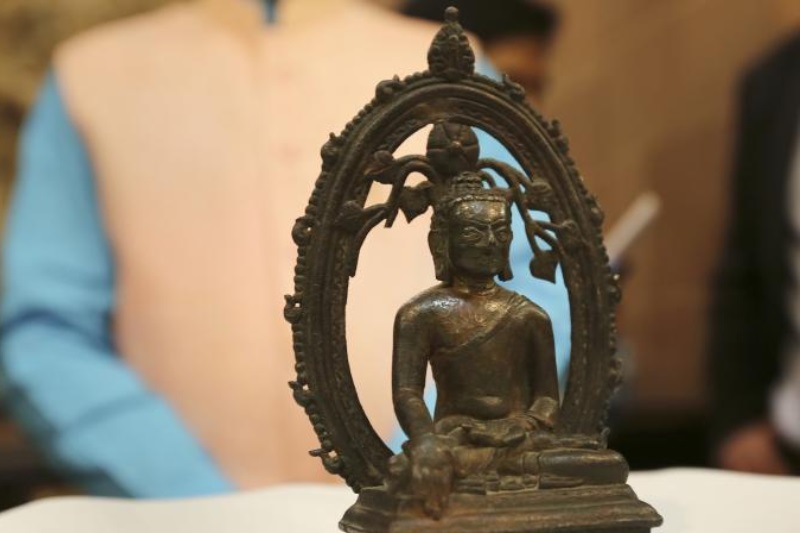A 12th–century bronze statue of Buddha stolen from a museum in Bihar nearly 60 years ago, was returned to India by the London’s Metropolitan police to mark the country’s 72nd Independence Day celebrations on Wednesday.
The bronze sculpture with silver inlay was one of the 14 statues robbed from the Archaeological Survey of India (ASI) site museum in Nalanda, Bihar in 1961 and is believed to have changed several hands over the years before being eventually found at the London antiques auction with a dealer, who had put it up for a sale.
It was identified at a trade fair in March this year by members of the Association for Research into Crimes Against Art (ARCA) – an organisation working to preserve cultural heritage – and the India Pride Project, which aims to recover stolen artifacts, reported The Guardian.
According to the police, once the owner and the dealer were made aware of the statue’s history they cooperated with the Met’s Art and Antiques Unit and agreed to hand over the art-piece to the government for it to be returned to India.


The stolen statue was then returned to the Indian high commissioner to the UK, YK Sinha, during the Independence Day ceremony at the India House in London, on Wednesday.
Also Read: This Independence Day, let’s differentiate between ‘Us’ and ‘Them‘
“I am delighted to return this piece of history. This is an excellent example of the results that can come with close cooperation between law enforcement, trade, and scholars,” Met Police Detective Chief Inspector Sheila Stewart was quoted as saying by the Press Trust of India. She was accompanied by officials from the UK’s Department for Digital, Culture, Media, and Sport at the handover ceremony.
“Although this was stolen over 60 years ago, this did not prevent the piece being recognised and the credit must go to the eagle eye informants who made us aware that the missing piece had been located after so many years,” she added.
Indian high commissioner Sinha termed the return of the historical “priceless Buddha” as a “wonderful gesture” and a particular honour to him, given his own roots in Bihar.
“I hope it will now go back to where it originally belongs… On our Independence Day, it (the statue) highlights the multi-faceted cooperation between the two countries,” he said, following the Tricolour-hoisting ceremony at the Indian High Commission in London.
Detective Constable Sophie Hayes of the Metropolitan Police’s Art and Antiques Unit, said, “We are delighted to be able to facilitate the return of this important piece of cultural heritage to India. Particular credit must go to the eagle-eyed informants who made us aware that the missing piece had been located after so many years.”
Michael Ellis, the UK Minister for arts, Heritage and Tourism, said that Britain remains of the first countries to recover one of the 14 statues ransacked from Eastern India.
“As we celebrate India’s Independence Day, I am proud to highlight the latest example of the UK’s cultural diplomacy in action. Thanks to the work of the Metropolitan Police’s Arts and Antiques Unit, we are one of the first countries to recover one of the 14 elusive Buddha statues stolen from Nalanda nearly 60 years ago.”
“This underlines how law enforcement and the London art market are working hand in hand to deliver positive cultural diplomacy to the world,” he concluded.

